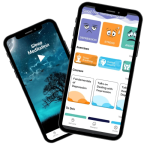Online Dynamic Interpersonal Therapy | Best therapist For Mental Health Help
- Set up a free & confidential chat on your mental health issues
- Unlimited help through our self-care app
- Live Video or Chat sessions with top Dynamic Interpersonal therapists
Begin Therapy
Consult online with best Therapist
Get the Best Help for Mental Health
TherapyMantra is here to help you on your path to recovery from mental health issues. We match you with the best Dynamic Interpersonal therapists available 24/7 via video call or messages.
Match with Dynamic Interpersonal Therapists
We assign the best counselors experienced in Dynamic Interpersonal Therapy based on your needs.
Affordable and Effective
Our online sessions are 90% less expensive than in-person therapy, available 24/7.
Self-Care for Mental Health Issues
We offer ongoing Self-Harm support through self-care tools, teen help videos, chat groups, meditations, breathing exercises, and other resources.

Wondering if it’s just a phase or something more? Take our Free online mental health tests to find out?
How it works?
You are matched with a Dynamic Interpersonal counselor based on your needs and preferences. You get a secure “therapy room” where you can communicate with your counselor via chat or phone. You can write or talk about mental health issues & ask questions to deal with Mental health issues.

Register for Dynamic Interpersonal Counseling
Simply complete a 5-minute online form to tell us about your mental health issues

Consult with your Dynamic Interpersonal Therapist
We connect you with Dynamic Interpersonal counselors who are available 24/7 based on your preferences and needs.

Connect to Our App
Apart from Video/chat sessions, our app offers self-care tools, videos, and meditations to help you deal with your mental health issues.
Best Dynamic Interpersonal Therapists
Positive conversations, exercises, and meditations are used by TherapyMantra psychologists to help you deal with mental health issues. Our mental health issues therapists outperform traditional counseling as you get matched from a pool of 500+ mental health counselors, who offer 24/7 unrestricted private chat.








What Is Dynamic Interpersonal Therapy?
Dynamic interpersonal therapy (DIT) is an evidence-based, short-term psychotherapy treatment. It was originally developed by psychologist David Malan in the 1960s and has been adapted to modern-day society with modifications for current research findings on how best to help people move forward after trauma. DIT is used as a way of helping survivors of abuse, assault, or any type of traumatic event process their experiences so that they can find peace and healing.
This therapy is short-term and focuses on recovery work instead of digging into the past. It helps survivors build up their resources so that they can start living a normal life again.
How Does Dynamic Interpersonal Therapy Work?
Dynamic interpersonal therapy is a short-term treatment option designed specifically with trauma survivors in mind. It focuses on recovery work instead of digging into past experiences (which can take up too much time) and helps build up the survivor’s personal coping skills so that they’re able to move forward after experiencing significant pain from traumatic events.
It also helps the survivor build up their resources. This is done by having the therapist and client work together to identify what those resources might be. The therapist then helps the client to use those resources in their day-to-day life.
The psychotherapist and the survivor meet for a total of twenty sessions. Dynamic interpersonal therapy is not designed to be done in one long session, so this means that it’s completed over twelve weeks with two meetings per week. During these sessions, doctors work on three important goals:
- To help survivors identify their traumatic experiences and how they affect their life now.
- To help them to use their resources in everyday situations that may be triggering for the client, such as meeting new people or going out into crowded places.
- To help survivors start thinking about what kind of future they might like to have, even if it’s very difficult for them right now.
Sessions of Dynamic Interpersonal Therapy
Sessions of dynamic interpersonal therapy last for fifty minutes each. The first thirty minutes of the session are typically used for discussion, with the final twenty being focused on homework that is designed to help the survivors work through their experiences in a more effective way.
There are approximately twenty sessions in total, with two meetings per week. There is a twelve-week time limit and after this period of time, the client will be reevaluated to see what else they might need from treatment. These sessions are:
Session 1-5: In this session, the therapist and client will discuss the goals of therapy and what to expect from dynamic interpersonal therapy.
Session6-10: In this session, the therapist and client will work on identifying traumatic experiences that have occurred in the past.
Session 11-15: In this session, survivors will start using their resources in different situations. The therapist will help them to do this in a safe way.
Session16-20: This is when survivors begin thinking about what kind of future they would like to have, even if it’s difficult for them right now.
Sessions last for fifty minutes each with two meetings per week totaling twenty sessions over twelve weeks; Sessions focus on discussion (thirty minutes) then homework designed to help the survivors work through their experiences more effectively.
Types of Issues Treated With DIT
Dynamic interpersonal therapy is not just for people who have experienced abuse or assault. It can be helpful for anyone who has gone through a traumatic event and is struggling to cope as a result. This might include things like car accidents, natural disasters, or exposure to violence. Some other issues that it will help includes:
PTSD
This therapy is specifically designed to help those who suffer from PTSD. It can help them to identify their traumatic experiences and how they affect their life now.
Depression
If someone is struggling with depression, this therapy can help them to start thinking about what kind of future they would like to have, even if it’s difficult for them right now.
Anxiety Disorder
This therapy can also be helpful for those who are struggling with anxiety disorder. It will help them to use their resources in different situations that may trigger their anxiety.
Relationship Issues
If someone is having difficulty in their relationships, this therapy can help them build up the skills needed to maintain healthy relationships. This includes things like communication and boundary-setting skills.
Adjustment Disorder
If someone is struggling with adjustment disorder, this therapy can help them to start coping with their symptoms in a more effective way. It will also help them to identify any traumatic experiences that may be contributing to their disorder.
How Effective Is Dynamic Interpersonal Therapy?
The effectiveness of dynamic interpersonal therapy is still being researched. However, there are some studies that indicate the benefits of this type of treatment for PTSD and depression.
Many researchers have looked into this treatment and the results have been promising. The client’s symptoms of depression, anxiety, and PTSD were reduced after receiving dynamic interpersonal therapy for a period of four to seven months.
The research is not conclusive as yet but initial findings are very encouraging especially when compared with existing therapies which tend to be long-term treatments that can take years before any improvement is seen in patients’ mental health conditions.
How To Find a Dynamic Interpersonal Therapist?
TherapyMantra can help you find a dynamic interpersonal therapist near you. We have over 500+ therapists listed on our therapist directory. You can follow the following steps to find a good Dynamic Interpersonal Therapist:
- First, ask your family doctor or anyone else you are seeing for a referral for mental health therapist.
- The next thing you’ll want to do is ask your friends and loved ones for referrals.
- The next thing you’ll want to do is look online. There are many websites that help people find therapists in their area who can treat things like mental health issues.
10,000+ Happy & Healed patients

“I was suffering from depression all my life. Even after visiting a lot of counselors, I didn’t get the results. TherapyMantra came to my rescue as the therapist here performed helped me to recover. They used Dynamic Interpersonal counseling that proved to be very beneficial for me. ”
Kevin,
1 year on TherapyMantra
FAQs
The therapy will last for a total of twenty sessions which is twelve weeks. Sessions are fifty minutes long and meet two times a week.
Session focus on discussion (thirty minutes) then homework designed to help the survivors work through their experiences more effectively.
This therapy is not just for people who have experienced abuse or assault. It can be helpful for anyone who has gone through a traumatic event and is struggling to cope as a result. This might include things like car accidents, natural disasters, or exposure to violence. Some other issues that will help include PTSD, depression, anxiety disorder, relationship issues, and adjustment disorder.
The effectiveness of dynamic interpersonal therapy is still being researched. However, there are some studies that indicate the benefits of this type of treatment for PTSD and depression. More research is needed to determine if it is an effective treatment for other mental health conditions.
Yes, there is a lot of homework involved in this therapy. The goal is for the survivors to work through their experiences more effectively so that they can start to see improvement in their mental health condition. This will require effort and dedication from both the survivor and the therapist.
If you are unable to attend a session, please let your therapist know as soon as possible. You may be able to make up the missed session or reschedule it for another time. However, please note that missing sessions can impact the effectiveness of the therapy.


